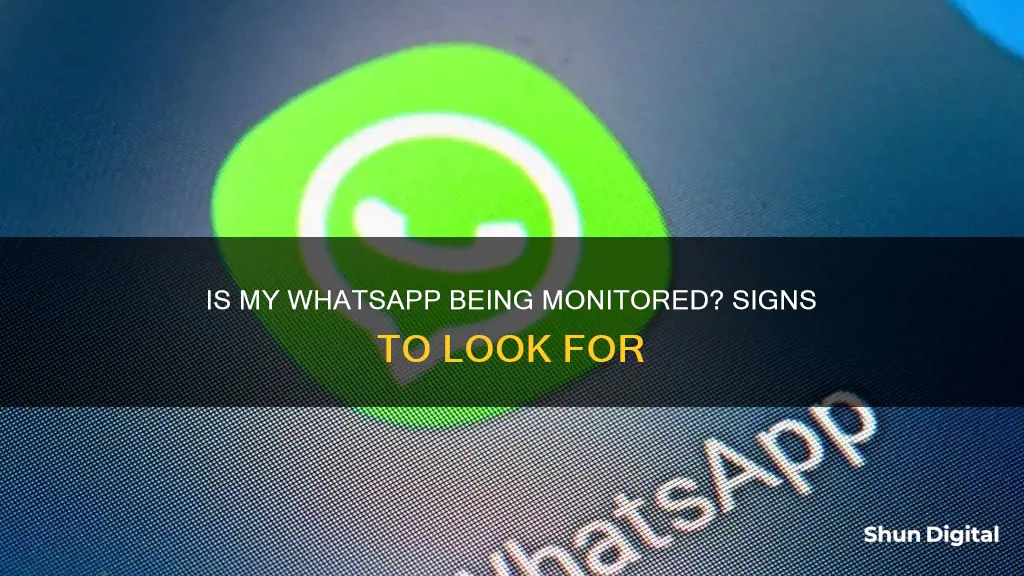
WhatsApp is a convenient and popular communication tool that connects people worldwide. However, it's essential to be vigilant about your privacy and security on the app. While WhatsApp emphasises user privacy and security with features like end-to-end encryption, it's not impenetrable. Here's how you can tell if your WhatsApp is being monitored and what steps you can take to enhance your privacy.
| Characteristics | Values |
|---|---|
| Unusual noise or notifications | Phone vibrates without any notifications |
| Temperature hike | Spy apps can overuse RAM, causing excessive heating |
| Lag performance | WhatsApp running slower than usual |
| Rapid battery drain | Phone needs to be charged more often |
| Unusual background noise during calls | Someone could be recording your calls |
| WhatsApp Web shows recent activity that wasn't you | Someone else has access to your account |
| WhatsApp stops working randomly | Spyware installed on the phone |
| Phone slows down | Spyware using up phone's processing power |
| New contact information has been added | Hacker trying to change your contact information |
| Location permissions given to modified WhatsApp versions | Modified versions ask for permission to access storage, location, etc. |
| Recently installed any fake or spy apps | User tricked into installing the app |
What You'll Learn
- Check for unusual activity on WhatsApp, such as read messages or conversations with unknown contacts
- Monitor your phone for signs of background apps, including unusual noise, rapid battery drain, and lag performance
- Be aware of unexpected calls or messages requesting personal information, which could be social engineering attacks
- Review your WhatsApp Web sessions and log out of any unknown devices
- Check your contact information and notification settings for any unauthorised changes

Check for unusual activity on WhatsApp, such as read messages or conversations with unknown contacts
If you suspect that your WhatsApp account is being monitored, there are several red flags to watch out for. Unusual activity on your WhatsApp account could indicate that someone else has access to it. Here are some things to look out for:
- Read messages that you didn't open: If you notice that a message has been read, but you didn't open it, it could mean that someone else has access to your account.
- Conversations with unknown contacts: Pay attention to your chat list. If you see messages sent to or received from unknown contacts, it could indicate that someone else is using your account to initiate conversations.
- Unfamiliar notifications: Be vigilant about notifications regarding WhatsApp Web access. If you receive notifications about WhatsApp Web activity that you didn't initiate, it could mean that a hacker has accessed your QR code and scanned it on their device.
- Unknown devices: Check the list of devices logged into your WhatsApp account. If you find any unknown devices, log them out immediately.
- Changes to your contact information: A hacker may attempt to change your contact information for their own malicious purposes. Regularly check your contact information and verify that it is accurate and up-to-date.
- Changes to your account settings: Review your WhatsApp account settings and the "About" section for any unfamiliar changes. If you notice any modifications that you didn't make, it could indicate that someone else has accessed your account.
It's important to be vigilant about any unusual activity on your WhatsApp account. If you suspect that your account is being monitored, take immediate action to secure your account and prevent further unauthorized access.
Installing Pillow TFT LCD Monitor: A Simple Guide
You may want to see also

Monitor your phone for signs of background apps, including unusual noise, rapid battery drain, and lag performance
If you suspect that your WhatsApp is being monitored, it's important to be vigilant about any unusual activity on your phone, such as unfamiliar notifications or performance issues. One way to do this is by monitoring your phone for signs of background apps that could be secretly tracking your activity. This includes paying attention to unusual noises, rapid battery drain, and lag performance.
Unusual Noise
Your phone may vibrate without any notifications, or you might hear strange noises in the background during calls. This could indicate that a spy app is running in the background, using your microphone to record conversations or ambient sounds.
Rapid Battery Drain
If you find yourself needing to charge your phone more often, even though you haven't been using it extensively, it could be a sign that a spy app is running in the background. These apps can consume a lot of power, leading to faster battery drain.
Lag Performance
If your WhatsApp is running slower than usual, or your device is hanging or blanking, it could be due to a spy app overusing your device's RAM. This can cause performance issues and slow down your WhatsApp.
While these signs may indicate the presence of a spy app, it's important to note that they could also be caused by other factors. For example, a rapid battery drain could be due to an outdated operating system, too many apps running in the background, or extreme temperature variations. Lag performance could also be a result of multiple apps running location services or an outdated phone. Therefore, it's important to consider other factors and not jump to conclusions.
To confirm whether your WhatsApp is being monitored, you can also check for other signs, such as unfamiliar activity on WhatsApp, recent access to your device by someone else, or changes to your contact information. Additionally, you can use anti-spyware apps to scan your device for any spyware or malware. Taking proactive measures, such as enabling two-step verification and using a VPN, can also help protect your WhatsApp from being monitored.
Troubleshooting ASUS VG248's Generic PNP Monitor Registration
You may want to see also

Be aware of unexpected calls or messages requesting personal information, which could be social engineering attacks
Unexpected calls or messages requesting personal information could be social engineering attacks. Social engineering is a broad term for malicious activities that manipulate people into divulging sensitive data or breaking security protocols.
- Be aware of suspicious calls or messages: Be cautious if you receive an unexpected call or message requesting personal or financial information. Scammers often pose as trusted individuals or organizations to trick you into sharing sensitive data.
- Verify the caller's identity: If someone calls claiming to be from a legitimate organization, hang up and call the organization directly using the official contact details to verify the caller's identity.
- Be cautious of generic greetings: Pay attention to the greeting used in messages or calls. Generic greetings like "Dear Valued Customer" or "Sir/Ma'am," combined with a lack of specific contact information, can indicate a potential social engineering attack.
- Look out for suspicious sender addresses: Scrutinize the sender's address for slight alterations or omissions that mimic legitimate business addresses. This is a common tactic used by cybercriminals to deceive recipients.
- Be wary of unsolicited messages with links or attachments: Unexpected messages containing links or attachments could be malicious. Hover over links to check the URL and ensure it matches the displayed text. Do not open attachments unless you are certain of the sender's identity and the purpose of the attachment.
- Enable two-step verification: Two-step verification adds an extra layer of security to your WhatsApp account. When enabled, any attempt to verify your phone number on WhatsApp must be accompanied by a six-digit passcode.
- Use secure passwords: Ensure you have strong, unique passwords for your WhatsApp and other accounts. Avoid using easily guessable information such as birth dates or names. A robust password should include a combination of letters, numbers, and special characters.
- Be cautious of calls requesting you to dial specific numbers: Be aware of scams where callers convince you to dial specific numbers, such as those starting with 67 or 72, which could be used to forward your calls to scammers.
- Educate yourself about social engineering tactics: Stay informed about common social engineering tactics and how to recognize them. This knowledge will help you identify potential threats and protect your personal information.
Resetting Your ASUS Monitor's Colors to Factory Settings
You may want to see also

Review your WhatsApp Web sessions and log out of any unknown devices
If you suspect that someone is accessing your WhatsApp account without your permission, you can take several steps to verify this and, if necessary, log out of any unknown devices. Here's what you can do:
Review Active Sessions in WhatsApp Web
- Open WhatsApp on your phone or tablet.
- Tap the three vertical dots (or "Settings" on iPhone) in the top-right corner of the main WhatsApp window.
- Select "Linked Devices" or "Image Nameed Devices" from the menu.
- Review the list of logged-in devices. If you see any unknown or unauthorised devices, tap on the session and select "Log Out" to remove access.
Review Your WhatsApp Contact Information
- Go to WhatsApp "Settings" by tapping the three dots in the top-right corner of the mobile app.
- Select your profile at the top of the menu.
- Review all the settings and verify that nothing has been changed without your knowledge.
- Tap on your profile picture and check the "About" section for any unfamiliar changes.
Review Your WhatsApp Conversations
Review your chat list for any unknown conversations, such as messages sent to or received from people you don't know. This could indicate that someone else has accessed your account.
Review Notifications and Messages from WhatsApp
Check your WhatsApp notifications and messages for any alerts about account changes or access. For example, if you receive a notification about WhatsApp Web access that you don't recognise, it could be a sign that someone else is using your account.
By following these steps, you can help ensure the security and privacy of your WhatsApp account. If you identify any unknown or suspicious activity, take immediate action to log out of all sessions and enhance the security of your account.
Monitoring Table Sizes on Unix: A Comprehensive Guide
You may want to see also

Check your contact information and notification settings for any unauthorised changes
To check your contact information and notification settings for any unauthorised changes, follow these steps:
For Android users:
- Go to Settings by tapping on the three dots in the top-right corner of the WhatsApp mobile application.
- Tap on your profile at the top of the menu.
- Go to Information and verify that the information is accurate.
For iPhone users:
- Tap the three dots on the top-right corner of the WhatsApp mobile application.
- Choose "Settings".
- Tap your profile at the top of the menu.
- Go through all the settings and verify that nothing has been changed.
For all users:
- Pay attention to any unusual notifications or changes to your contact information, such as unknown conversations or messages from unknown people.
- Check for any unauthorised devices logged into your WhatsApp Web by tapping the three dots on the top-right corner of the WhatsApp main window, then tapping "WhatsApp Web" and reviewing the logged-in devices. If there is an unknown device, select the session and log out.
- Be vigilant about unfamiliar activity on WhatsApp, such as messages being read or sent without your knowledge.
- Regularly check your WhatsApp conversation list and notifications for any unexpected changes or activity.
Monitoring Electricity Usage: Room-by-Room Power Insights
You may want to see also
Frequently asked questions
There are several signs that your WhatsApp is being monitored. These include unusual noise or notifications, rapid battery drain, lag in performance, and an increase in your phone's temperature.
If your WhatsApp is being monitored, there is a risk that sensitive information will be intercepted and posted online or shared with others. This includes personal data, family photos, and contact information.
If you suspect that your WhatsApp is being monitored, you should take immediate action. First, check for any unknown apps on your device and uninstall them. Then, log out of all active sessions on WhatsApp Web and enable two-step verification. Finally, change your passwords and enable two-factor authentication (2FA) for added security.
To protect your WhatsApp account, consider using a virtual private network (VPN) and enabling location services only when necessary. Keep your device and apps updated, and be cautious when downloading files or granting permissions to apps.
If you notice any unknown conversations or messages sent to or received from unknown contacts, this could indicate that your WhatsApp conversations are being monitored. Also, check for any unexpected changes in your account settings or contact information.







